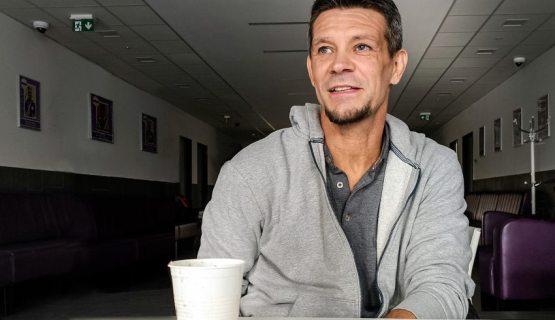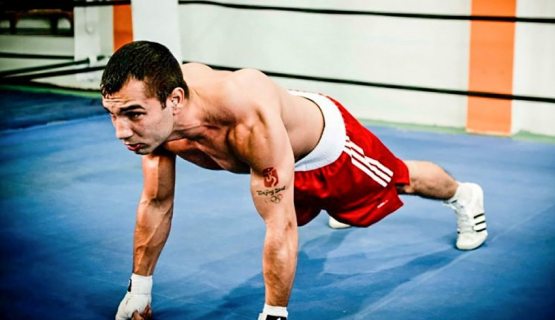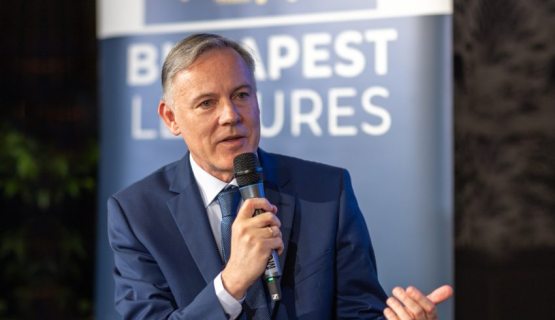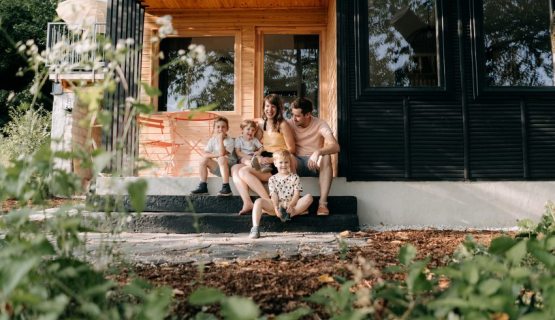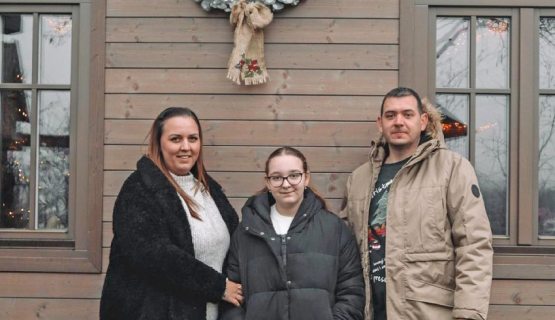”We never take wrestling home” – an interview with Tamás Lőrincz and Viktor Lőrincz
When Tamás Lőrincz became an Olympic champion and was interviewed, his words stood out among the many "I did it", "I achieved", "I won" statements. He repeated, "I am happy that I have been given this". I thought it was then, in these exceptional moments, that the true character of a person is revealed. He arrived for the photo shoot with his silver medal-winning brother Viktor Lőrincz: two good-humoured, playful, modest wrestler boys with elaborate muscles and ripped ears. They never stop looking for a hold on each other, but there's a certainty in their banter: that the other will never try to overpower him, and would even hold him if he had to.
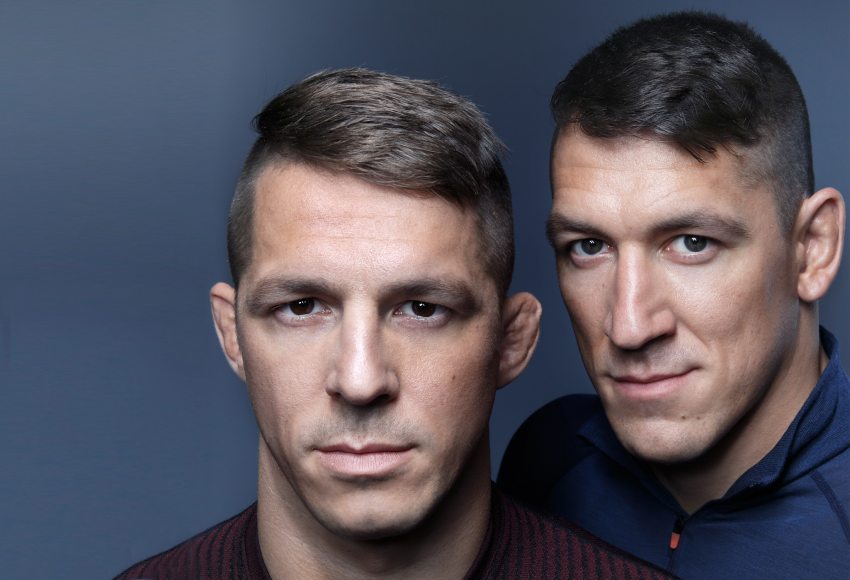
- I've read in a previous interview that you were naughty boys. When did you become so modest and reserved?
Tamás: Most sports require a certain amount of self-confidence, but respect for the sport and humility are much more important. In that interview, you might have felt that I wanted to quit after Rio. I didn't feel that it was in my career to win another medal, let alone a gold, at the age of 34... It was also a big thing that I was able to qualify for the Olympics in the one higher weight class, Viktor had a very difficult time, he was unfairly judged against in the bronze medal match in Rio. Ok, Viktor was not so modest, but I taught him to be.
- By the way, how much do you hold up a mirror to each other?
Tamás: He is constantly criticizing me.
Viktor: I was going to say the exact same thing.
Viktor: This is what our sport teaches us, humility, diligence, determination... of course you need self-confidence, but it's important not to let it turn into arrogance. We were specifically asked by the sports psychologist before the Olympics to be "arrogant" on the mat, but we knew that it couldn't be taken off the mat. Of course, there are some things a younger brother overlooks from his older brother...
Tamás: Ha-ha…
Viktor: ...but we really take turns passing the ball to each other. If we don't like something, it’s not our wives who we tell that to, but each other. This works for us.
- Can we say that it stays on your mat?
Viktor: Yes, that’s right. And this is good because we can talk everything over.
Tamás: I don't really remember a single idea I had that he liked the first time, though… All wrong, all rubbish…
– And vice versa?
Tamás: Well, if he doesn't like it, I'm not going to leave it...
– So the wrestling is on …
Tamás: Outside the mat, he's the only one who wrestles, when he comes off the mat he's always much more involved, and has a stronger opinion on everything, I tend to digress. We talk about these things a lot, we ask each other for opinions, I ask his, he … well he never asks mine.
Viktor: Ha-ha…
– Has being brothers always been an advantage in the sport and in the team?
Viktor: I think it's definitely an advantage: it's good to be able to train together during the preparation, and also during the long training camps because we are away from the family, but we are there for each other.
Tamás: We have to train a lot more than if we were competitors from a bigger country, where you have a wider range of competitors, and more training partners, where you can learn more techniques. We can compete with endurance and more training. That's why these training camps are so important.
Viktor: Even in a world competition, having a family member there adds something that no one else can, even if you have a good relationship with the coach and your teammates. It was also doping that although there were other brothers in wrestling, we wanted to do better than them and thus won the European Championship medal, the World Championship medal and finally the Olympic medal.
- How much was the little “Skippy” (“Szöcsi”) in the shadow of the big “Skippy”?
Tamás: When I moved from Cegléd to Budapest, he started to open up, to mature, but he was a much more mature boy than me, and the four years between us soon disappeared, because I, on the other hand, was a very late maturing type. He took over everything at home as soon as I left. Sure, they called him Little Skippy, but he was never in my shadow.
– But you did pave the path.
Tamás: Exactly.
Viktor: I just took advantage of the fact that I was able to go down this path. Sometimes people compare you to your older brother, but that's their business. I don't regret being his younger brother for a minute.
Tamás: How many times did I go the wrong way... he didn't have to try those. Or when I started sports high school, I didn't know what I was taking on, I fought against everything, even though I wanted it, I had to get there physically and mentally. And he always says that those were his best years.
– What was difficult for you?
Tamás: At home, we had basic things to comply with, school, training, and obviously I was expected not to set the house on fire, but basically our parents were easy-going, they let us be independent from a very young age.
That's why it was very difficult for me at the sports school in Budapest, where I was told every minute what to do when to train when to study, when and how much to sleep, when to eat, what to eat, I didn't have a free minute. It took me 2 years to get used to it.
It was the early phase of the sports academies of today, they experimented a little bit with us, at 8:30 PM we weren’t even allowed to talk, it was lights out. That's not the case today, by the time Viktor came up, the system had already changed a lot, they realized that children need some kind of freedom, or at least they should believe that they have freedom because it's not easy for them to leave home. Of course, this is a double-edged sword, but I must admit that I don't like it when people say that someone has been mixing with the wrong crowd, because I've been in all kinds of crowds myself, but if someone has the right attitude, the right upbringing... of course, I know that today it's a different world, we hear a lot of bad things...
– You will fear for your son…
Tamás: I went to school alone at the age of 9, and everywhere else, and as soon as I reached the door handle, I picked Viktor up from kindergarten. Today it's hard to imagine, especially in Budapest...
– Viktor, how did you feel about the sporting lifestyle and freedom?
Viktor: I always looked forward to Wednesdays, to go to the training of the national team, to learn a new move, to be praised by the coach. People asked me what my plans were for the future. I could tell they wanted me, too. It was a very good feeling. In eighth grade, I wanted to continue here, but I didn't get in. The negotiations went on for three weeks, I had a teammate who was already up there and I didn't know if I could come. That was the worst. I wanted to go up so much after him, I liked the system: morning training-school-afternoon training-dorm – I liked that. Sure, it's exhausting for a teenager, but I liked the academy system, and the people there. As the years went on and people dropped out, when the company started to wear off - it was hard. By my senior year, I was the only one from my room who went to training. But then I was soon selected for the junior national team.
Tamás: Viktor was talented and really wanted to come. In seventh grade, I did not have the goals he had.
Viktor: A 13-year-old is still a child, I would be quite worried today if my daughter wanted to take the train to Budapest alone, but Tamás, I think you would be too if Marci decided to do so...
Tamás: Our parents let us do it, even though they didn't know what it meant to be a professional sportsman, that it was a vocation... and our grandparents had absolutely no idea. They asked our parents what we thought not to have chosen a trade.
- The father in both of you has just spoken. It's not so common for a rising career in elite sport to include family life.
Viktor: Obviously it's not easy with small children, that's what I thought until I saw that it could be done. I was encouraged by Tamás' example.
He already had both of his children when we were preparing for the Olympics, and my wife and I planned to have the baby after the 2020 Olympics. But we hadn't counted on the Olympics being postponed, and we couldn't reschedule at the beginning of 2020 because my daughter was already on the way. I was there from the beginning, even at birth, it gave me a lot of energy, the energy I didn't even know existed.
Tamás: And obviously you need a partner to be there because it's not easy to do it alone with one child, let alone two. During the preparation phase, we are at home very rarely, often away for weeks. At those times we don't hear news of a fire breaking out, or something exploding or collapsing. There needs to be a strong pillar at home for that so that we only have to concentrate on wrestling.
– Your wives are also athletes, European champions, and Tamás' wife also wrestled.
Viktor: And mine was in fitness. That was the point. She knew precisely what it took to be successful in elite sport. We persisted and have been together for 11 years.
Tamás: But it was not only our wives but also the secure support of our parents that enabled us to achieve such results.
– What would you like to do in the same way as them?
Viktor: I copy them. In our house, our mother was a strong personality, and I just said to my wife the other day that I would like her to be the stricktstricter one because I can't always be present and I don't want to be strict for this reason.
Tamás: You won't be able to change your personality, now I'm telling you, you're going to be the stricter one. Anyway, our father was strict too, he just didn't have much space besides our mother. We have the same thing. My wife is a bit like Viktor both in her personality, and in being unyielding.
Viktor: So she's your dream partner, that’s what it's called.
– Tamás, can you tell us what convinced you to continue after Rio?
Tamás: Viktor, mostly, with his authoritative style. He had an even harder time than I did, but he encouraged me. I was 30 at the time, I knew I couldn't go down to 66 kilos anymore, because that was already superhuman, and I thought it was the end, it was still beautiful. I had a sense of lack, a great deal of it, but I wanted to let it go. And then he came along and said, "Let's not stop, Tokyo this, Tokyo that. I liked that after the blow he'd taken, he was still pulling me out, and I agreed to try it for another year. I was confident that he would win an Olympic medal, but I wasn’t confident in myself. Then came the competitions, and the results, and I started to believe it.
– Is it easier to be confident in the other than in yourself?
Viktor: Everyone knew that there was more to Tamás' career. When he beat the reigning world champion in the higher weight class, he started to believe it too and eventually surpassed everyone's hopes.
– Is there a quality in the other person that you really like and lack?
Tamás: Yes, there is. I'm quick to jump into everything, sometimes it'd be good to sit down and think it over. I've often made the mistake of wanting to have or do this or that... sometimes I would need to step back. I'm not as deliberate as he is.
Viktor: For me, it's definitely that I find it harder to open up to new things. If he doesn't start his life anew in Budapest from Cegléd, I would have been thinking about it at home until it becomes nothing. He never just talked about doing it, he went and did it.
No Hungarian has ever won an adult European Championship as a junior. He went there and did it. But it was the same with fishing, which is now our common hobby. We complement each other.
– Is wrestling a topic in the extended family?
Tamás: We never take wrestling home, and this is good so.
Viktor: Never. We wrestle from Monday to Friday, then talk about everyday life, like all families do, and it's great to have something else take the focus.
– Tamás, you said that you thought about not continuing because of the family.
Tamás: There will be fewer and fewer challenges that motivate me enough not to spend evenings at home with my family. I would like to read the bedtime story to my children. Now, having said that, we are home even less these days, because there are so many requests, it's one of those times.
– Many fear what will take the place of the rigorous schedule of elite sports. Does family help with this transition?
Tamás: Obviously, the grey weekdays will play it out, but I've been looking forward to it for a while. Of course, I will miss wrestling, but I've been looking forward to trying my hand at something else, and of course, I might end up coaching in a few years' time. Getting out of the rhythm of life, and watching a world championship from the outside, watching the world championships from the stands will definitely be strange. Viktor still has an Olympics in his career, but if I make up my mind, sooner or later he will come after me, as he usually does.
– What do you like about wrestling?
Tamás: We could say some commonplace here, but in short: that's us.
Viktor: That's exactly what I was going to say. Wrestling made us like this. I often think I wouldn’t have that determination, maybe we wouldn't be able to bounce back from a failure like that, or would not be able to get out of a negative train of thought. The most that we owe it to this sport is that it has shaped us into who we are.


